THE NOTE
WI ENVIROTHON TESTS STUDENTS’ RESOURCE SKILLS
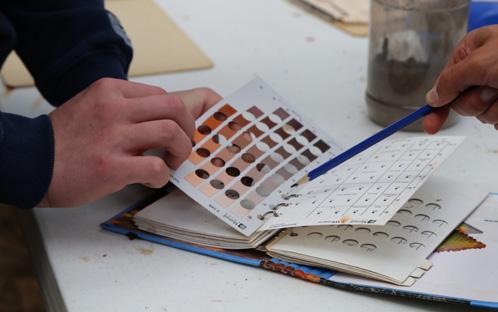
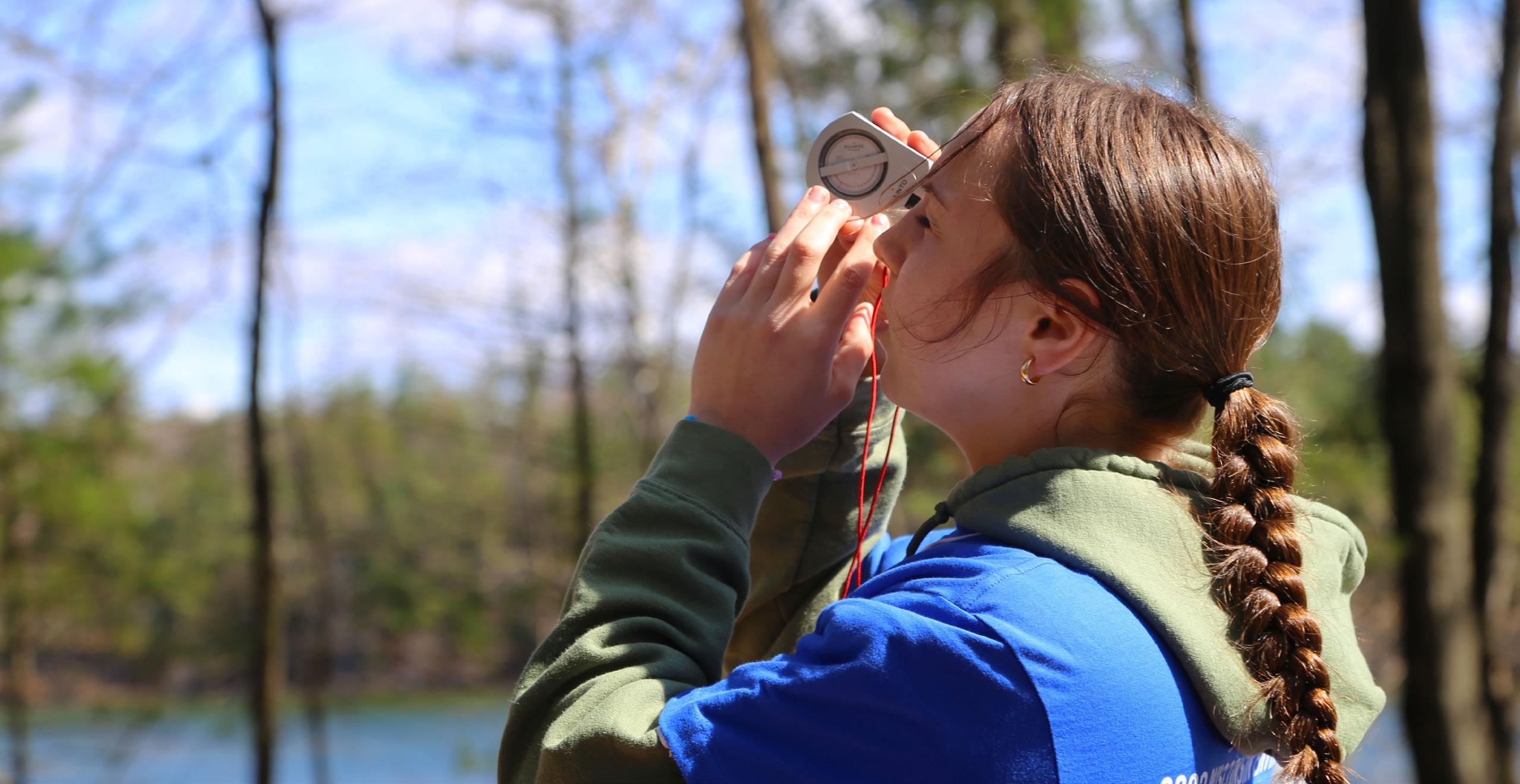
With college-level exams developed by natural resources professionals, students rise to challenge at Envirothon. (Page 10)
Upcoming Events: Inside this issue:
June 15
SITCOM Meeting
June 23
Conservation Observance Day
July 13
WI Land+Water Board Meeting
July 13-14
County Conservation Meeting at Stevens Point
August 17
Southern Area
Association Meeting
August 22
Professional Improvement (PIC) Meeting
August 22
Technical Committee Meeting
August 25
North Central Area Association Summer Tour
September 15
Lake Winnebago Area Association Summer Tour
70th Annual Conference recap
Nearly 500 conservation professionals attended the inperson event in the WI Dells.

Page 6
RSVP for Conservation Observance Day
Schoepp Family Farms will host the free, public event on June 23 in Columbia County.
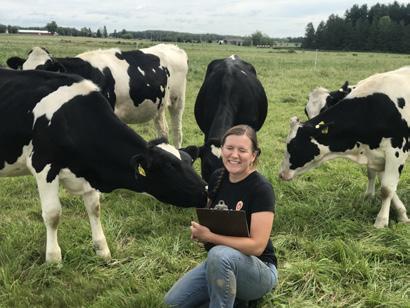
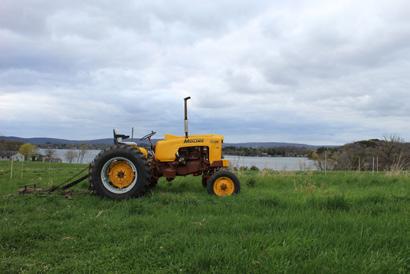
Page 9
SITCOM explores new mentorship program
Almost 40% of survey respondents expressed interest in having a mentor. Page 14
Volume 32 | Issue 1 FOR OUR CONSERVATION COMMUNITY To learn more about supporting locally led conservation efforts, visit wisconsinlandwater.org.
MESSAGE FROM MATT

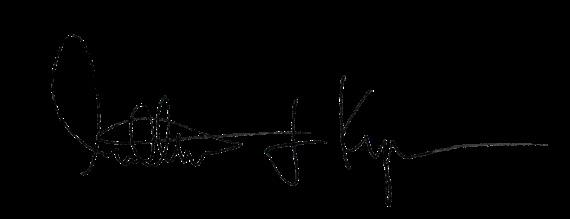
None of us are in the field of conservation for the paycheck or instant gratification. Our work is difficult, requiring great persistence, planning, cooperation, and human and financial resources. Storms—of both the climatic and political nature—can upend years of effort.
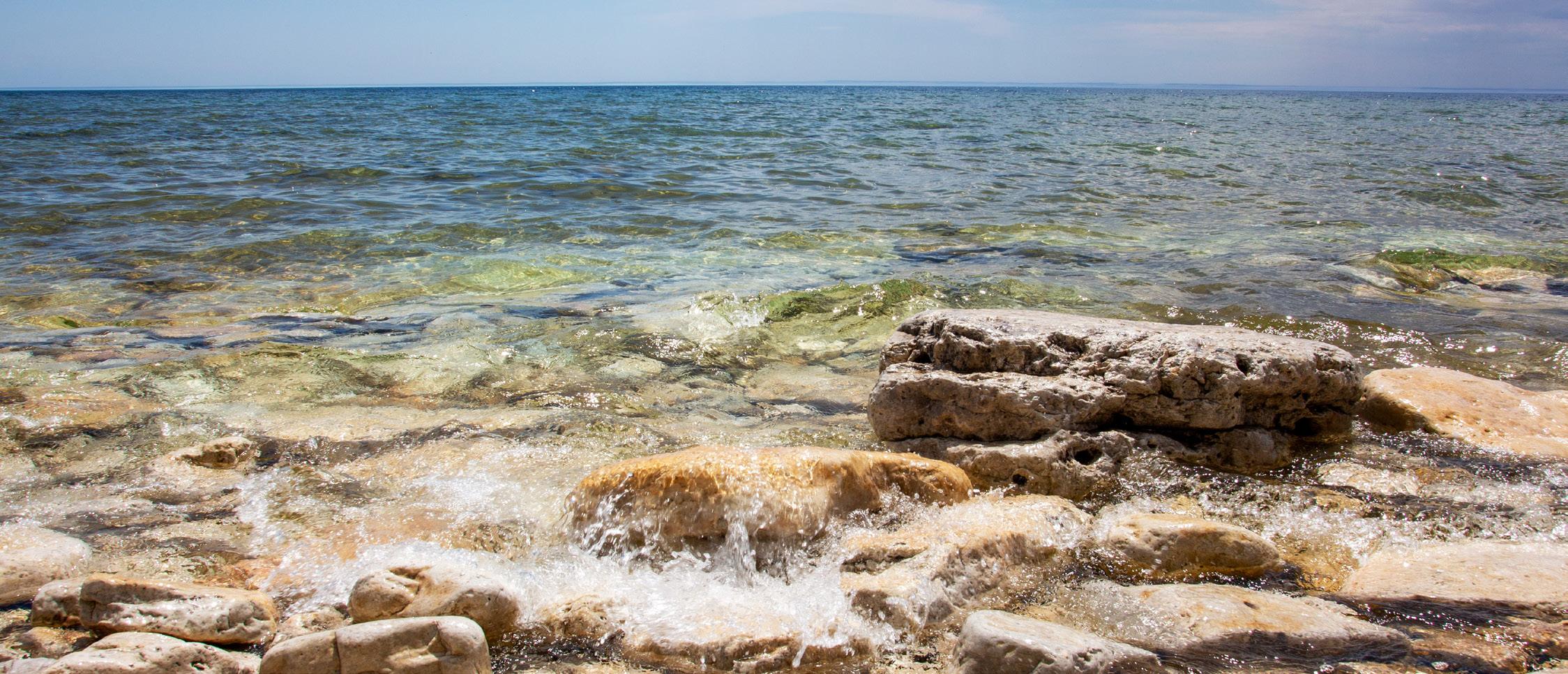
Furthermore, in order to succeed in conservation, one needs to wield an incredible depth of vision, balancing the immediacy of day-to-day tasks with progress toward long-term goals. One eye must be firmly fixed on the present, while the other keeps a focus on the future. (Not everyone possesses this vision, and some peoples’ eyes definitely get crossed in the process.)
After a reluctant winter finally loosened its grip on Wisconsin, field season is now upon us and conservation projects are in full swing, with grant applications, contract approvals, and landowner engagements filling up the calendars of county land and water conservation departments. Even amid the hubbub of field season—especially at this moment—it is worth a moment’s pause to look to the horizon and consider the long-term, landscape-scale goals we collectively work toward. While those goals may be locally specific, such as reducing nutrient inputs to a stream or eradicating invasive species in a lake, more broadly, our collective goal—the purpose we all aspire is to—is to leave a legacy of clean land and water for the generations that follow. That legacy is arguably why most of us are in the field of conservation.
As is typical for an issue of The Note, this one finds us celebrating the successes of the here and now...but this time, with a particular eye toward the legacy to which WI Land+Water’s programs contribute. The annual Wisconsin Envirothon highlights our conservation leaders of tomorrow, and it assures us that our future is in very capable hands. The exploration of a State Interagency Training Committee conservation mentorship program that would share and enhance institutional knowledge among conservationists is an exciting prospect we are considering.
Our participation in the newly formed Clean Economy Coalition of Wisconsin is an opportunity to work alongside new and diverse organizations whose efforts and partnership could be crucial as we adapt to the evolving challenges of a changing climate. In partnering with governmental, private sector, and academic institution representatives, the Standards Oversight Council builds technical standards that are effective, efficient, and sustainable; this continues to contribute to Wisconsin’s conservation legacy that is both innovative and practical. And as it is budget season in the capitol, we continue to advocate for resources for county land and water conservation departments, to ensure our members are able to build the long-term legacy of clean land and water in Wisconsin.
Matt Krueger Executive Director



2
CONNECT WITH US ONLINE: @wisconsinlandwater @wilandwater youtube.com/c/WILandWater
Joint Committee on Fiance 2023-25 Budget Process Update

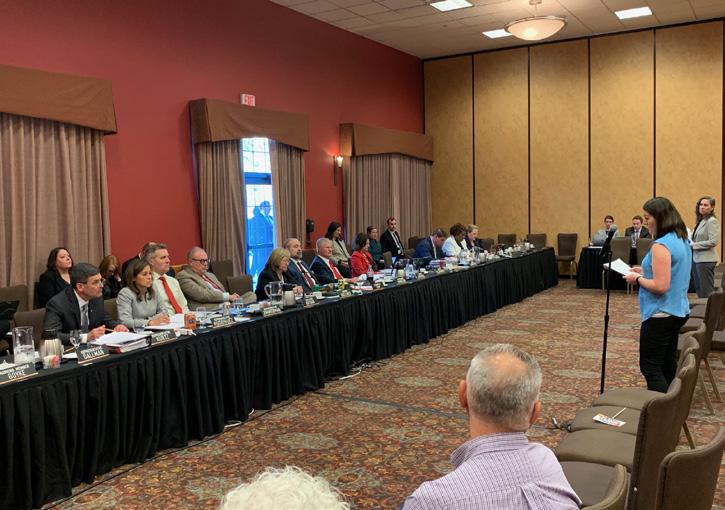
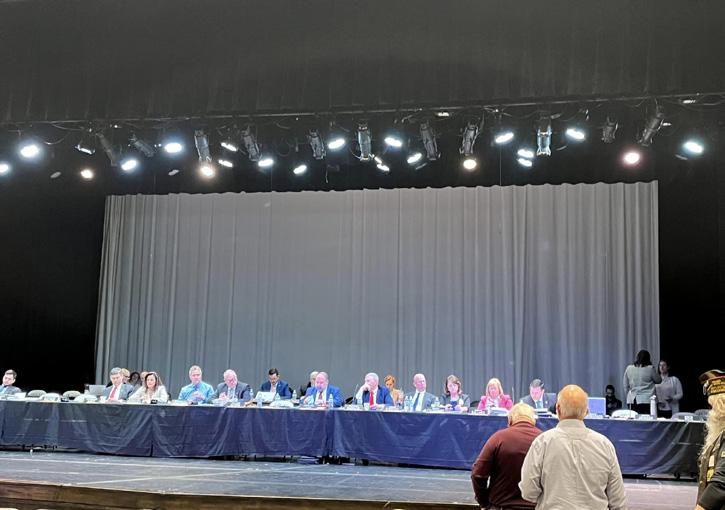
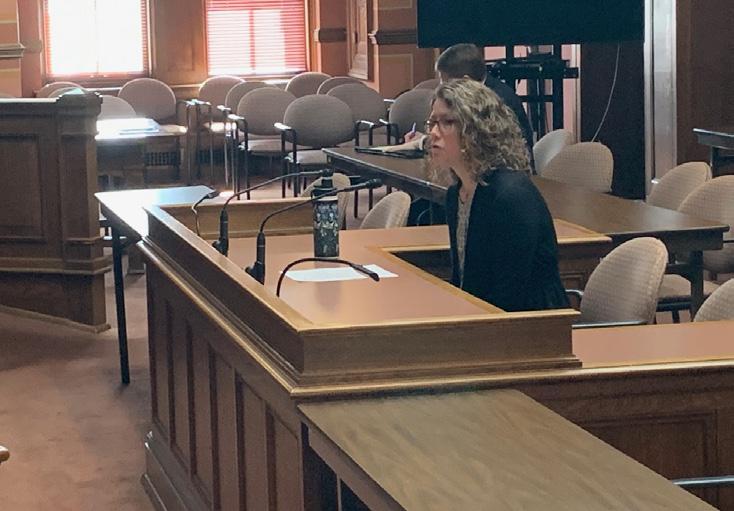
The Joint Finance Committee voted last week on provisions in the DATCP and DNR budgets, including county conservation staff funding. For a full explanation of what we know so far, please read our latest Capitol Update. This is a developing situation that we are working to understand more about, but we understand that it is likely that county conservation staff funding will be adjusted by JFC before the end of the budget process.
However, it is evident that there is still progress to be made in ensuring that our state legislators understand and support the efforts of county conservation departments. One focus should be on cultivating advocates for county conservation within the Capitol, individuals who will champion our cause. One way to achieve this is by actively promoting county conservation whenever opportunities present themselves.
One approach to fostering county conservation champions is to invite elected officials to see firsthand the work of county conservation departments. An excellent opportunity to do so is through upcoming area association summer tours. These events highlight your impressive projects, and are obvious choice for inviting your elected officials. If you
require assistance in sending out these invitations, please reach out to WI Land+Water staff.
We do want extend a tremendous thank you to all of our members who voiced their support for our cause in recent months. Your engagement plays a crucial role in establishing a strong foundation of support for our work!
CONSERVATION AT THE CAPITOL AND BEYOND
3
Katie Abbott, Iowa County Conservationist, testified in support of AB 133 before the Assembly Committee on Agriculture. This bill aims to offer improvements to the Farmland Preservation Program. Following the testimony, Katie was quoted by WPR and invited to discuss the Farmland Preservation Program on WORT.
The JFC held four public hearings across the state. The Ashland County Land and Water Conservation Department spoke to the JFC during a hearing in Minocqua, reminding elected officials that county staff are the state’s most effective system for providing on-the ground assistance and implementation for conservation practices.
Melissa Schlupp, Sauk County Conservation Manager, provided testimony at the JFC hearing in the WI Dells. Several farmers that work with Sauk County’s conservation staff offered statements in support of county conservation for the Conservation Works StoryMap, which was shared with representatives during meetings.
Breezy Haven Farm in Dunn County gives tour to Governor Evers during Earth Week

LEARN MORE ABOUT FARMER-LED GROUPS:
Red Cedar Conservation Farmers: dunncountywi. gov/?SEC={78511A11-F514414A-A8B7-A6451B2F9687}
Dunn County Farmer-Led Watershed Groups: www.co.dunn.wi.us/index. asp?SEC=%7b6B4575C1-D35C436B-8CA9-9AF1189C469A%7d
Producer-Led Watershed Program: https://datcp.wi.gov/ Pages/Programs_Services/ ProducerLedProjects.aspx
DATCP Commercial Nitrogen Optimization Pilot Program (NOPP)
https://datcp.wi.gov/Pages/ CommercialNitrogen OptimizationPilotGrant Program.aspx
Breezy Haven Farm, a sixth generation farm in Dunn County operated by Aaron Dietsche, recently hosted Governor Tony Evers. The visit not only marked a celebration of Earth Week, but also highlighted the importance of supporting conservation practices used by Wisconsin farmers to protect our watersheds. Breezy Haven Farm is one of about 30 farms that participate in the Red Cedar Conservation Farmers (RCCF) Farmer-Led Watershed Group.
RCCF is facilitated by Dunn County Land and Water Conservation Division. Dunn County LWCD applies for funds for RCCF from the Wisconsin Department of Agriculture, Trade, and Consumer Protection (DATCP) through the Producer-Led Watershed Protection Grant Program. The program’s goal is to improve Wisconsin’s soil and water quality by supporting and advancing producer-led solutions that increase on-the-ground
practices and farmer participation in local watershed efforts.
With this money, RCCF offers incentive payments, hosts educational events, and conducts research and demonstrations to encourage practices that improve both crop production and soil health while also improving downstream water quality.
“We have to continue to provide resources for them to do it. It’s not cheap, but they’re making some really significant progress,” said Gov. Evers
RCCF received $24,400 in 2023 through the DATCP Producer-led Watershed program. In 2023, RCCF also received a $150,000 grant through the DATCP Commercial Nitrogen Optimization Pilot Program for on-farm research at four of the RCCF farms that will be conducted in 2023 and 2024.
4
1
2
3
4
Pictured (left to right): Heather Dietsche (Breezy Haven Farm), Aaron Dietsche (Breezy Haven Farm and RCCF Lead Farmer), Governor Evers, John Wantoch (RCCF Board Member), Tina Barone (Dunn County LWCD RCCF Facilitator), Lynn Dietsche (Breezy Haven Farm), and Mark Dietsche (Breezy Haven Farm)
J.E.D.I. Resources now available online in the Members Hub
Wisconsin has a rich legacy of conservation, protecting the lands and waters of the state. They connect us all, from past generations to current and future ones. We believe that everyone should have a voice in protecting the water that we drink, the land we that farm, the parks where we play, the sites that tell our history, and the places that we call home.
While some demographics in the conservation sector have been shifting, they do not reflect the demographics of Wisconsin or necessarily mean that attitudes are also changing. This lack of diversity and inclusivity creates challenges in our ability to effectively collaborate and to address soil and water issues.
Our Equity Working Group has been building resources and opportunities to help people start doing this work. At the Annual Conference, we invited Alonzo Kelly to take attendees on a learning journey aimed at increasing knowledge and ability to utilize critical
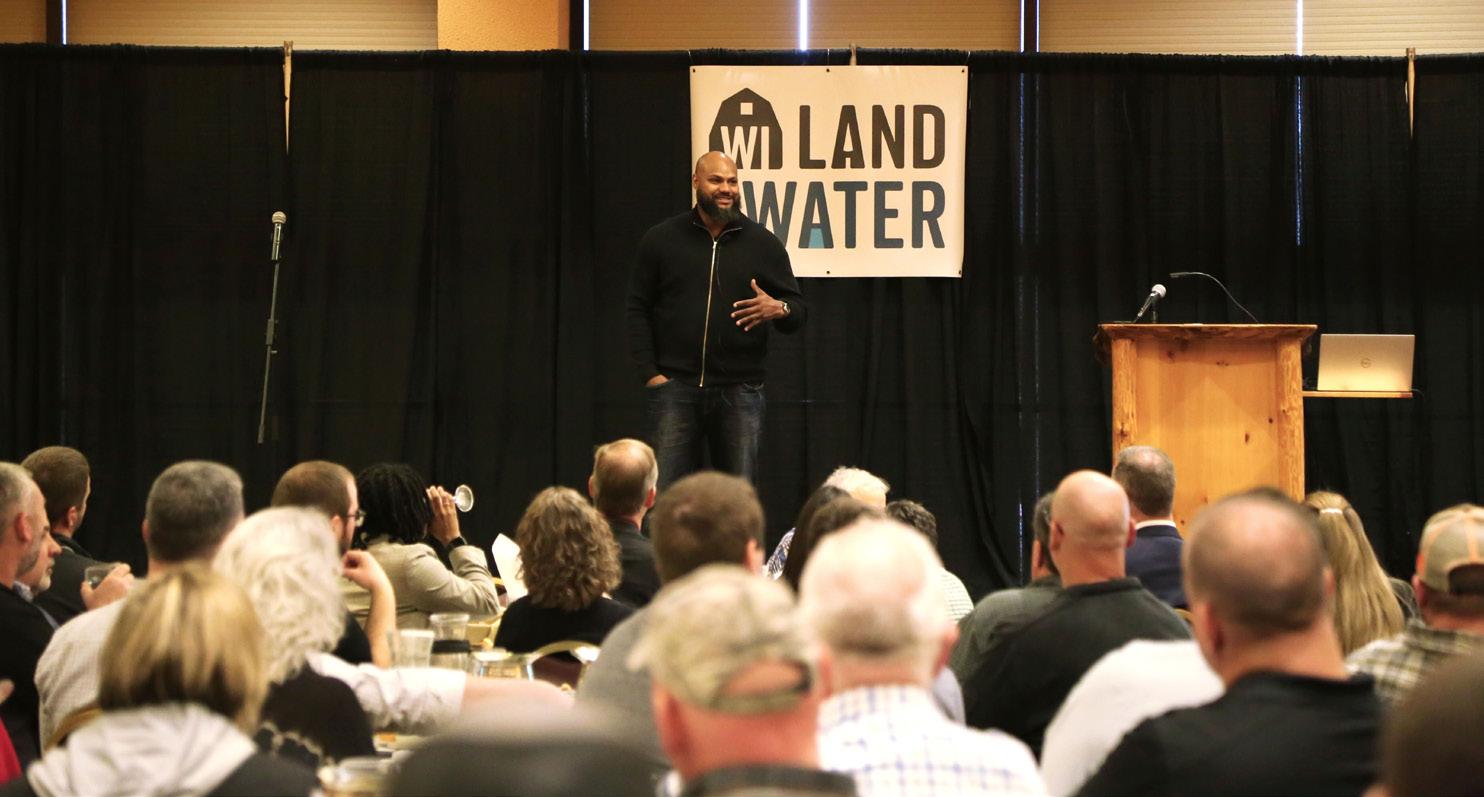
thinking skills to make authentic connections during his keynote and breakout session. The conversations Kelly initiated didn’t end in those rooms; we heard people using language from his presentations throughout the rest of the Conference including the phrases “good good” and “funny ‘til it’s not funny.”
We hope that these conversations don’t stop there. To support this, we created a Justice, Equity, Diversity, and Inclusion (J.E.D.I.) webpage with a curated selection of resources intended as a starting point to support conservation staff and officials in integrating these concepts into their everyday work. Topics include expressing the importance of these concepts to Land Conservation
Committees, intergenerational workplaces, environmental justice, and more.
This is meant to be a living page that we update and change with resources as we learn together about these topics. We are all on a journey of learning and this page will reflect that as we add or adjust it, including a future addition with personalized videos from Alonzo Kelly.
Together, we can evolve to create a more equitable sector for all those involved in conservation and it begins by asking questions, having conversations, and continually learning. Visit the JEDI resources page at wisconsinlandwater.org/members-hub/ jedi-resources
2022 SITCOM Annual Report
Now available to read online, our 2022 Annual Report details WI Land+Water programs and accomplishments.
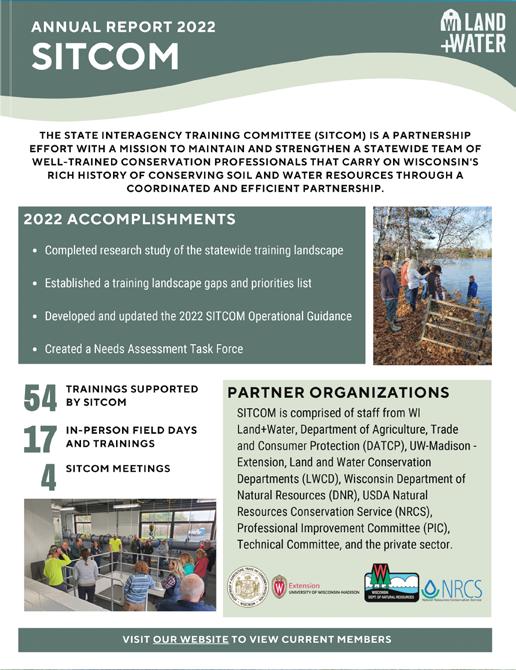
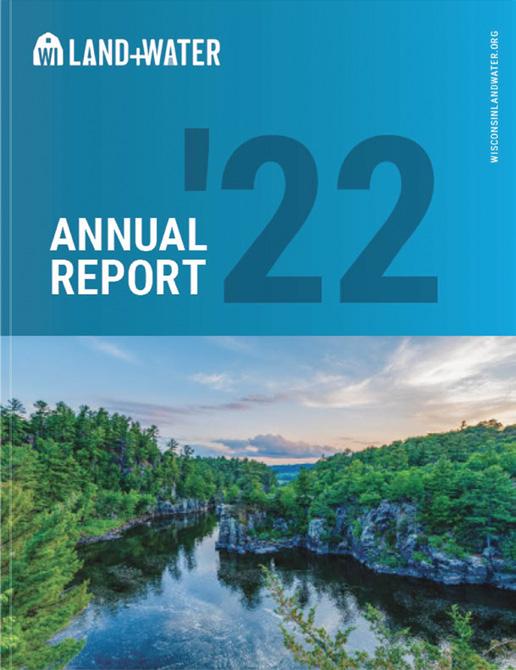
Find it here: wisconsinlandwater. org/about-us/ publications
The SITCOM Annual Report details the interagency committee’s accomplishments.
Find it here: wisconsinlandwater. org/assets/article/ Annual-Report-2022SITCOM-flyer.pdf
5
2022 WI L+W Annual Report
Decades of conservation celebrated at our 70th Annual Conference
The annual event brought together nearly 500 conservation professionals from Wisconsin and beyond, including county land conservation committee (LCC) members, land and water conservation department (LWCD) staff, state and federal agency staff, and representatives from nonprofit and industry organizations.
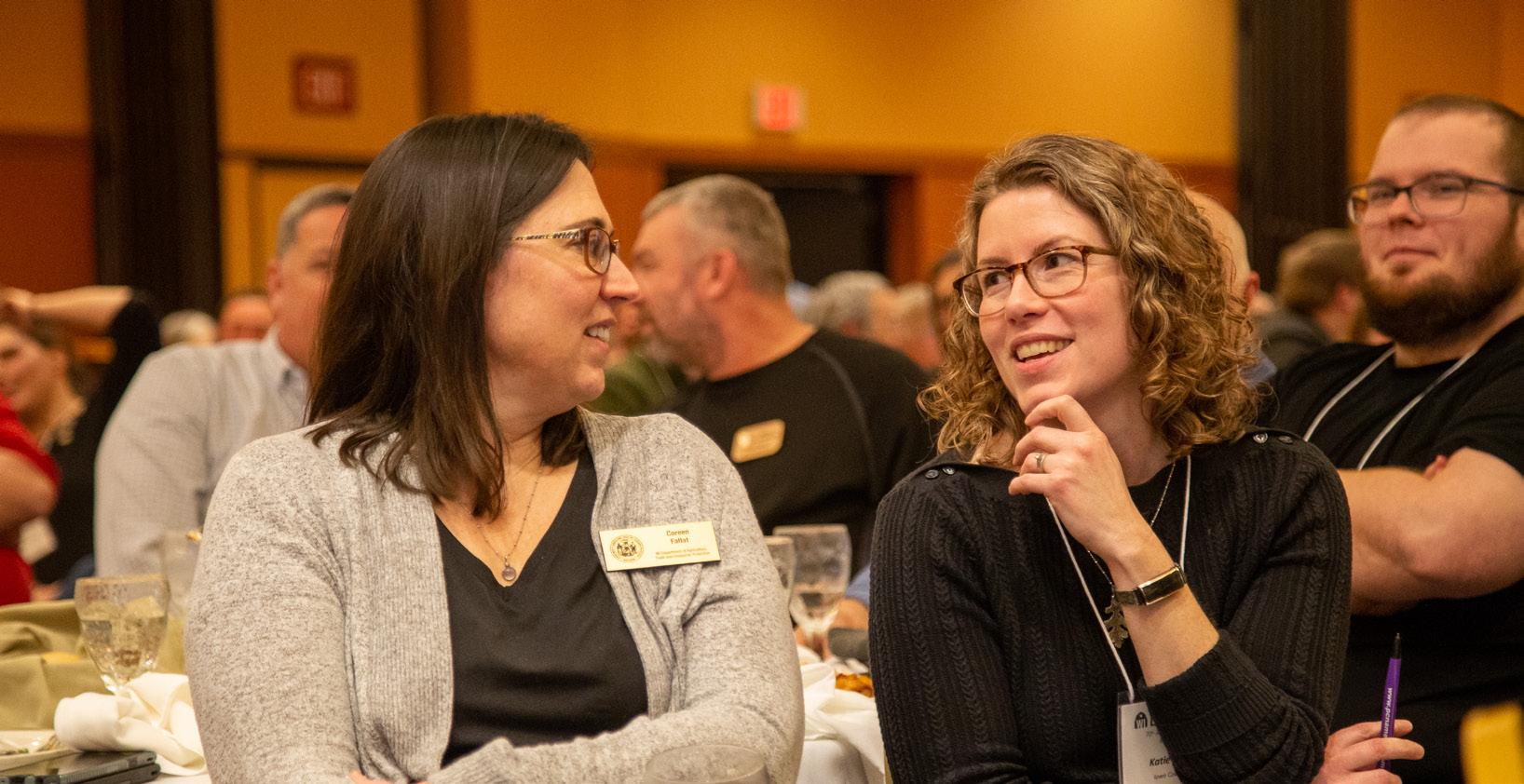
The conference started on Wednesday, March 1, and environmental historian and conservation biologist Curt Meine delivered the opening remarks. Meine is known for his writing and work on Aldo Leopold, and he used this opportunity to stress the significance of developing relationships, whether between individuals or between people and land.
On Thursday, Alonzo Kelly, globally recognized strategic leadership coach, continued the theme of building genuine relationships during his keynote speech. Kelly’s dynamic and interactive address
engaged the audience in the art of asking better questions to establish meaningful connections.
Over the course of three days, attendees participated in 40 breakout sessions that included technical roundtables and conservation presentations, covering topics such as urban stormwater management, agroforestry practices, and conservation communication skills.
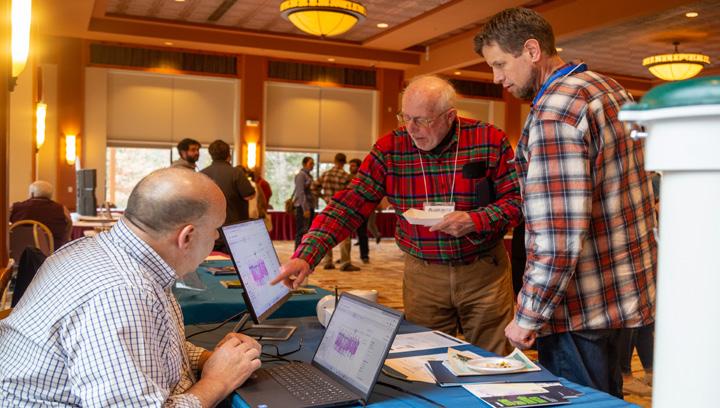
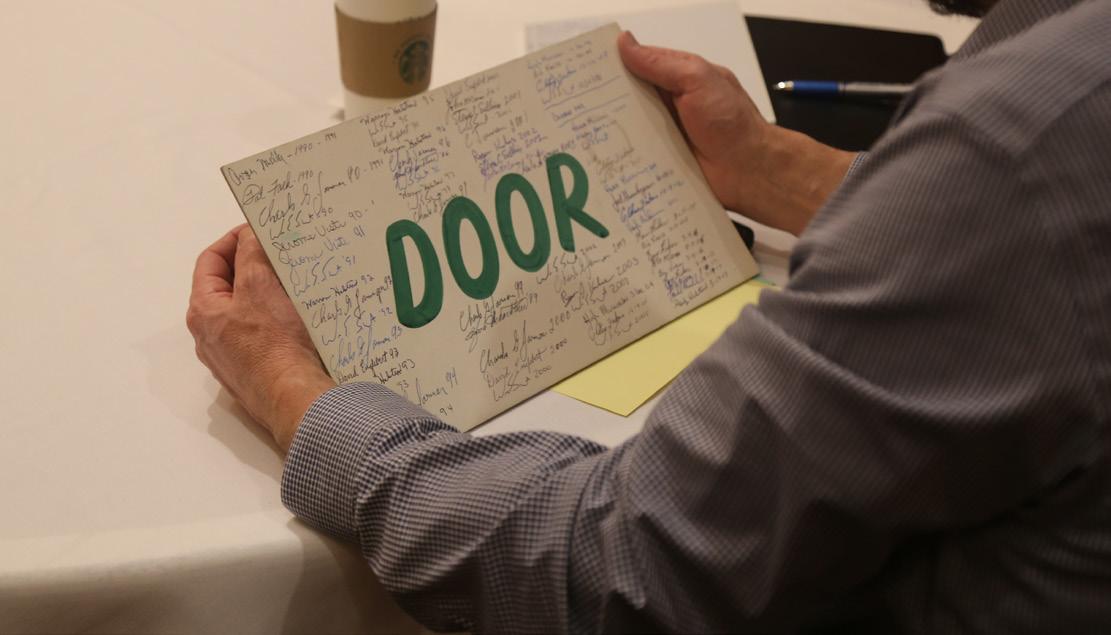
Many of the breakout sessions offered Continuing Education Credits (CEUs) or Professional Development Hours (PDHs) for technical staff to maintain their job certifications and licenses and learn about the latest best management practices in their fields. Social hours followed the breakout sessions, providing attendees with opportunities to network with exhibitors, bid on silent auction items, and purchase raffle tickets to support training scholarships for members.
During the interactive “Face of Conservation” breakout sessions, newer employees connected with veteran conservationists, agency partners, and other members of their cohort.

With more than 30 conference sponsors, attendees were able to network with other organizations and business during social hours and between panels.
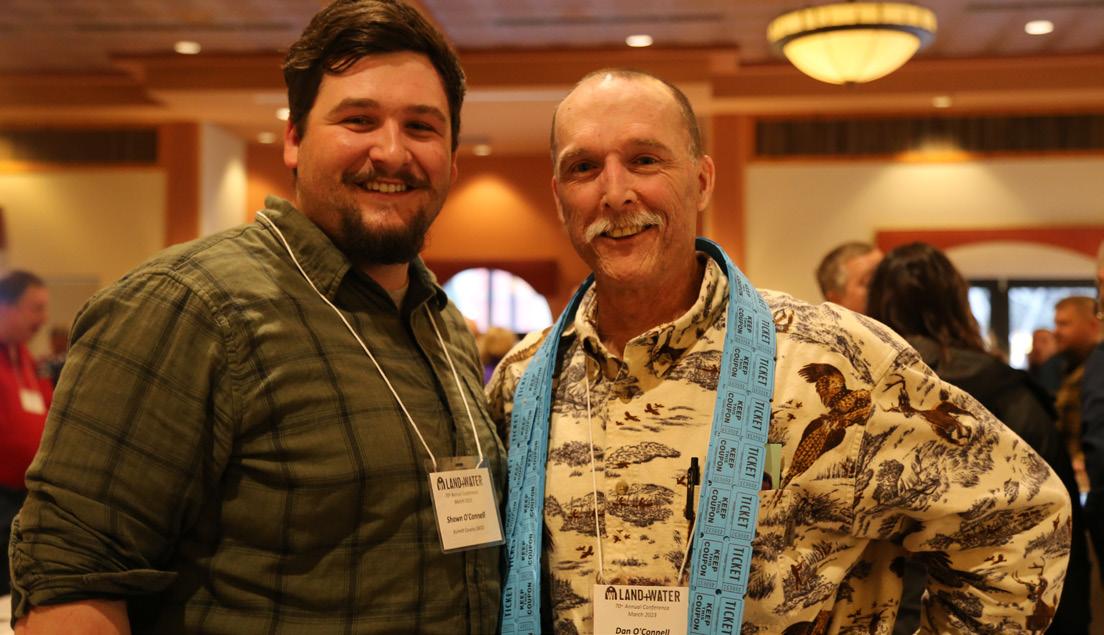
6
It was heartening to see attendees at the event feeling empowered and reinvigorated, ready to continue their important work in the years to come.
Matt Krueger, WI Land+Water Executive Director
Each year counties sign their Business Meeting voting paddles. Father and son, Dan and Shawn O’Connell, enjoy social hour.
Coreen Fallat (DATCP) and Katie Abbott (Iowa Co.) participate in Kelly’s interactive lunch keynote.
66th Annual Poster & Speaking Contests

As part of the conference, our Youth Education Committee hosted the 66th Annual Conservation Awareness Poster and Speaking Contests. The speaking contest featured students from across Wisconsin delivering speeches on important conservation topics, while the poster contest showcased artwork with the theme of “One Water.” Members of the Youth Education Committee and volunteers from county land conservation departments judged the speaking contest, and our members and conference registrants voted on student posters.
At the conference’s opening luncheon, the first-place winners from the elementary, junior, and senior divisions of the speaking contest presented their speeches to a crowd of almost 500 conservation professionals and guests from across the state. The speeches addressed a relevant issue related to


soil and water conservation, with an emphasis on its impact on their locality or Wisconsin. For the poster contest, the first-place winners in the primary, elementary, middle, junior and senior divisions will represent Wisconsin at the National Association of Conservation Districts’ Poster Contest held at their annual meeting in 2024.
To see the winning posters and speeches, visit wisconsinlandwater. org/our-work/youth-education/posterspeaking-contest/2023-contest-results.

Youth Education Silent Auction
34 Counties/Orgs Donated Items
The Youth Education Silent Auction committee was excited to welcome the Silent Auction back in person after a few years. We would like to thank Megan Steckelberg, Adams County and Youth Education Committee member, for organizing and managing our silent auction. Megan (pictured left) took the lead in organizing the Silent Auction for the past four years and helped us streamline the Silent Auction, which increased the amount of money raised for our youth programs over the years. We are sad to see Megan leave but wish her well in her new position. We want to thank her for all of her work with the Silent Auction and Youth Education Committee through the years.
We would also like to thank all the counties and organizations for donating so many amazing items and supporting our Youth Education programs!
7
Senior Winner Amber Higley, Vilas County.
Youth Education Portage Co. had the highest total retail value
$6,787.87 total raised for
2023 Conservation Award Winners recognized at Annual Conference


We celebrated our 2023 Conservation Awards winners during the Conference with a lively banquet, hosted by Tracy Arnold and Pat Kilbey. Many of our winners were surprised with the news of their award and with their family and friends came to celebrate. We want to thank all of our recipients and families for their dedication to and lasting impact on Wisconsin conservation. Learn more about our deserving winners below!
OUTSTANDING COUNTY SUPERVISOR
FRIEND OF CONSERVATION
CONSERVATION LEGACY AWARD
County
Melissa has displayed her commitment to conservation through her positions as chair of Land & Zoning Committee, county board supervisor, southern area representative on the WI Land+Water board, and member on the WI Land+Water Executive Committee. She has exceeded expectations by helping form and carry out the Driftless Area Water Study. Additionally, she brought climate change to Richland County’s strategic plan. “She is not afraid to fight to make Richland County a better place to live,” explains her colleagues.

Mike is recognized for supporting conservation behind the scenes, as well as professionally. He has protected Wisconsin’s environment previously as a water quality biologist and now as a supervisor at the Department of Natural Resources. “He is particularly adept at building relationships and strengthening partnerships through unconventional pathways,” says his colleagues at the Dane County Land & Water Resources Department. Mike is credited with breaking barriers and strengthening community partnerships.
His passion for improving soil health and water quality led Andy to 37 years of service in Ozaukee County, following as a Soil Health Advocate with Milwaukee Metropolitan Sewerage District. “His leadership, experience, and passion for conservation set him apart,” explains Katie Vogeler of Ozaukee County. In 2016, Andy helped establish Clean Farm Families, a producer-led watershed group. His work with this group has improved soil health practices across Ozaukee County.

8
Melissa Luck, Richland
Andy Holschbach
Mike Sorge, DNR
OUTSTANDING COUNTY CONSERVATIONIST

OUTSTANDING CONSERVATION SPECIALIST
BRAD MATSON OUTSTANDING YOUTH EDUCATOR
Paul is a respected leader of conservation in Wisconsin. He is the founder of the producer-led watershed group, Cedar Creek Farmers. Throughout Paul’s career so far, he has worked with the public, educating them on the importance of conservation.


“Paul is the epitome of what a County Conservationist should be—a teacher, a leader, passionate, and committed to provide a better environment for all our state’s great citizens,” says Scott Schmidt of Washington County Public Works.
CONSERVATION FARM FAMILY OF THE YEAR

Throughout her 15 years working in conservation, “Marie is always thinking outside the box and pushing the limits of conservation programs with the soil, water, and landowners’ best interests at heart,” says Amy Piaget of the Land & Water Resources Department in Dane County. From working with farmers as a grazing specialist in Dane County to being the director of agroecology at the Kusamala Institute of Agriculture & Ecology in Africa, she is leader who is ready to face challenges and build collaborative relationships.

“Although it may seem near impossible to make such a huge impact in just over four years, Justine Bula has completely redefined how youth education is delivered in Sauk County,” her coworkers explain. Her partnerships with local school districts have improved and expanded environmental education programs and events. In addition, Justine coordinates the Clean Sweep and Ag Plastics collection programs. She is admired for her hard work and positive attitude.
“It is truly difficult to emphasize everything that the Schoepps have done to protect land, water, and wildlife integrity for no other reason than genuinely caring about doing so,” said Todd Rietmann, Land & Water Resource Management Senior Specialist for Columbia County. As recipients of the award, the Schoepps will also host the state’s next Conservation Observance Day on June 23, 2023. The free public event will showcase the family’s conservation practices, as
9
Marie Raboin, Dane County
Paul Sebo, Washington County
Justine Bula, Sauk County
well as their impact on the community and watershed.
Ron, Dave, & Nancy Schoepp
Wisconsin Envirothon welcomes 21 teams

During Earth Week, 21 teams from schools across the state spent a sunny, chilly spring day testing their knowledge at the Wisconsin Envirothon, held at the Lions Camp in Rosholt, WI.
Wisconsin Envirothon is the state’s ultimate middle and high school environmental science challenge where teams of four or five high school or middle school students participate in four hands-on, mostly outdoor field challenges designed by natural resources professionals and educators. Participating in this event helps students develop knowledge and skills to either pursue careers in conservation or use their knowledge to preserve our natural resources in whatever civic and career choices lie ahead.
“I am always amazed at the wellrounded career experience the students learn from competing in this competition,” said Kristen Kvalheim, Sun Prairie East High School
View complete list winners and more photos online:
Agricultural Education Global Food and Sustainability Academy FFA Advisor. “It gives students the opportunity to utilize tools and skills used in the field of these careers in natural resources and environmental sciences. It is truly preparing them for their futures.”
Sun Prairie East High School took the title of Overall winner in the High School level and will represent Wisconsin at the National Conservation Foundation-Envirothon taking place July 23-July 29, 2023 at Mount Allison University-New Brunswick, Canada.

The Wisconsin Envirothon is a program of led by our Youth Education Committee, and is made possible by the many generous volunteers made up of natural resource professionals and educators. The event also relies on the volunteer and financial support of many agency partners, county conservation departments, and organizations and businesses that are dedicated to conservation.
Learning about the environment in a hands-on way is always super engaging and a fun way to bond with my teammates. This event has allowed me to improve my presentation skills, teamwork, and problem solving skills. I’m absolutely stoked to represent Wisconsin at nationals again.
Jackson Nesbit, Sun Prarire East High School
wisconsinlandwater.org/our-work/youth-education/ envirothon/2023-results
10
Sun Prairie East High School Team - Kristen Kvalheim, Mylar Maughan, Logan Culbertson, Daniel Reid, Emma Washington, and Jackson Nesbit.
Current Issue Presentations: Adapting to a Changing Climate
Though the Current Issue theme is set each year by NFC-Envirothon, participating states write their own current issue scenario. This allows us to customize the issue to the impacts and strategies occurring in our region. This year, our Climate Resilience Program Manager, Christina Anderson, wrote that scenario.


For our competition, we set a familiar scene: A community is experiencing extreme weather events that are impacting their economy, which includes agriculture, urban centers, and a world class fishery. Competing teams were tasked with preparing a presentation for the community’s Climate Change Task Force. Students presented their ideas for adaptation and mitigation solutions to help the community prioritize climate action projects.
“The students did a fantastic job! Teams understood that implementing conservation is a great climate solution that both adapts landowners to extreme weather and mitigates climate change by lowering greenhouse gas emissions,” said Anderson. “It was energizing to hear the students’ breadth of understanding of the science, creativity in identifying solutions, and ideas for achieving community buy-in.”
Hands-on exam stations test
student knowledge
Students put their environmental science skills to the test by taking in-field exams that are written by resource professionals and educators to combine classroom learning with outdoor hands-on activities. Teams of 4-5 students rotate through four stations and work collaboratively to complete their exams in one hour.
At the Aquatic Ecology station, students work with water resources professionals to learn about aquatic ecosystems, identify aquatic organisms, discuss watershed management, and determine nonpoint source pollution.

For the Forestry station, professionals identify practices for the maintenance of healthy forests and test students on the basics of species identification, forest structure, and sustainable management approaches. The teams are tasked with identifying

several tagged trees and using instruments to determine their diameters and heights.
Wildlife experts provide students with a hands-on approach to testing students’ knowledge of animal populations, their dynamics, and the importance of habitat conservation. Teams work to examine species using pelts, photos, and prints.

For Soils and Landuse, soil scientists help students learn about soil structure, interpret maps, evaluate land forms, and discover soil characteristics that impact agriculture and development. Teams work in a freshly excavated soil pit to answer questions about land use and soil taxonomy.
We want to thank the professionals who take their time to mentor our state’s future conservation leaders!

11
Technical standards help protect Wisconsin’s natural resources


The mission of Standards Oversight Council (SOC) is to oversee a collaborative process for developing effective technical standards that protect Wisconsin’s natural resources. The SOC governing body consists of representatives from DATCP, WDNR, NRCS, UW-Madison Division of Extension, WisDOT, and WI Land+Water with support and participation in SOC confirmed in a 2020 Memorandum of Agreement

Visit socwisconsin.org to learn more about the SOC process and what technical standards are being updated.

The Standards Oversight Council 2022 Annual Report is now available. Read about our accomplishments online

Technical standards are a crucial component of soil and water conservation efforts in Wisconsin. They provide uniform planning, design, installation, and maintenance criteria for conservation practices based on current research, field experience and the best available technology. SOC maintains an ongoing effort to keep each technical standard current and engage users of the technical standards. By using the SOC process, a broad base of stakeholders are building on the existing legacy to develop improvements to technical standards. The overall result is better protection of Wisconsin’s natural resources.
Stay informed about future work by signing up for the SOC urban or agricultural email lists on our website
The long-term success of SOC is often dependent on strategic partnerships and participation by representatives of local, state and federal government, as well as private sector and academic institutions. SOC’s collaboration and engagement builds technical standards that effective, efficient, and sustainable while also working within the existing programs and regulations.

12
We’re offering counties free premium access to
We know that many of our counties are looking for graphic design tools that can streamline creating event flyers, infographics, and educational handouts. We’re excited to inform our LWCD members that WI Land+Water recently qualifed for Canva for Nonprofits, allowing us to add 40 additional users to our premium account. By joining the WI Land+Water Canva Team, members can use premium features for free, which includes access to premium templates, images, and videos. Currently, we are able to offer one membership per county, on a first come basis. If you are interested in learning more, please reach out to Kristin Teston (kristin@ wisconsinlandwater.org).
Register NOW for summer Conservation Camps!
» See how our counties use Canva: wisconsinlandwater.org/membershub/committees/outreach

» Fast-track your design skills with tutorials: canva.com/designschool/ tutorials

Our Youth Education Committee has been busy planning our two summer conservation camps. These camps offer exciting opportunities for Wisconsin’s youth to learn from natural resources professionals and foster a deeper appreciation for nature.



We also know that scholarships, such as the Brad Matson Camp Scholarship, allow many students to experience camp. This year we worked to collect information on the counties that offer scholarships for our camps to create a new page on our website that allows campers and parents to search for available opportunities. Learn more about our camps at wisconsinlandwater.org/ourwork/youth-education/conservation-camp

13
Middle School Conservation Summer Camp at Upham Woods JUNE 14-17 High School Conservation Summer Camp at Discovery Center JUNE 19-22
SITCOM explores new Interagency Conservation Mentorship Program with new task force
2023 has been a year of action for the State Interagency Training Committee (SITCOM), having recently revised its operational guidance to include task force subcommittees to address conservation training landscape gaps. These task forces consist of both sitting and non-sitting members of SITCOM, and are meant to represent all agencies and interests in a coordinated effort to enact lasting, systemic changes to address identified challenges.
Throughout January and February, one such SITCOM task force, in collaboration with representatives from county LWCDs, NRCS, DATCP, WDNR, and UW-Extension, designed and developed a new training needs assessment survey. This survey included a new drill-down methodology and tasked respondents to selfidentify their training interests and related experience levels. The survey was rolled out to staff in March, and received a total of 334 submissions from conservation employees across the state.
One question within the survey asked respondents of their interest in participating in a professional conservation mentorship or cohort program. Across all agencies represented in the survey, nearly 40% of respondents expressed interest in having a mentor, becoming a mentor for others, or both. Additionally, with more than 150 LWCD positions filled since the beginning of 2019, it’s clear that there is a vital need for a mentorshiptype program to support conservation staff across the state.
Because of the interest in a mentorship program and the need for new employee support, SITCOM has recently assembled a task force
of representatives from multiple agencies with the mission of exploring the possibilities and challenges of such a program and developing a recommendation for next steps at their June 2023 meeting.
Drew Zelle, DATCP Environmental Specialist for the northeast area, is one member of the task force. Reflecting on how mentorship has impacted his own career, Drew recalls how “the more experienced technicians were eager to share their knowledge and wisdom and pass that down to me. I had a cell phone full of contacts that could help me anytime. They talked me through issues and gave me the confidence to address them.”
Now looking to the future of Wisconsin’s professional conservation landscape, Drew considers confidence to be one of the most important things to pass on to the next generation of employees. “We need to encourage our

new employees that they can do the job, address the resource concern, and have a successful project, “ he shares. “Being positive and encouraging goes a long way to accomplish that and instill confidence in the individual.”
Kirstie Heidenreich, Marathon County Conservationist, is another member of the task force. In Marathon County, Kirstie observed that her team was “stratified by experience, as half the staff were senior-level Conservation Analysts, and the other half were entry to mid-level conservationists with either a few years’ experience or were brand new to the world of conservation.”
To address this issue, Kirstie established Marathon County’s own, internal mentorship and training program. “We developed training modules for Farmland Preservation, Nutrient Management, Animal Waste Ordinance, Manure Spills and Over Applications, Livestock Siting, NR
14
The Marathon County conservation staff during a streambank training.
151 Determinations, CREP, Selling Conservation, and much more.” Because of this effort, Kirstie sees that her staff “are now able to have confident conversations with [landowners] about all of the different aspects of conservation practices that they can consider, along with various programs that may be a good fit for them.”
Similar to Drew, Kirstie recalls how seasoned conservationists such as Greg Leonard and Bob Micheel helped
her become more confident and effective in her role. “It meant so much to me to learn how they ran successful conservation programs and their tips and mentorship helped make me successful in my career much sooner than if I would have had to figure it out myself.”
As SITCOM’s task force begins to strategize ways to bring the power of interagency mentorship opportunities to Wisconsin’s professional conservation

community, it is vital that the voices of future participants in a potential program have their voices heard.
SITCOM hosted a listening session to hear from staff in May of 2023, and the task force will be submitting a basic plan proposal for committee review in June.
Are you interested in participating in the pilot program? Reach out to Michael Hook (michael@wisconsinlandwater. org) for more information.
15
When we see land as a community to which we belong, we may begin to use it with love and respect. -Aldo Leopold
Building
Wisconsin’s Clean Economy, Together
As a founding member the Coalition, three of our staff—Matt, Kristin, and Christina, have helped to move the initiatives forward by advising in the following areas:
Clean Economy Coalition of Wisconsin launches


We are excited to announce the launch of the Clean Economy Coalition of Wisconsin (CECW). With a diverse set of partners, we have come together over our shared vision to enhance the economy through climate-smart solutions. Gov. Tony Evers joined coalition members to celebrate the official launch in March.

2
COMMUNICATIONS
Providing coalition members support to share our vision and messaging with the broader communities we serve.
3
THRIVING LANDS
Advocating for innovative solutions that support productive agriculture, resilient cities, and valued natural areas.
Since 2022, we have engaged with a diverse set of partners to address some of the most pressing issues facing our state. Agriculture, forestry, and water resources are not only at the heart of Wisconsin’s identity, but a major contributor to our state’s economy and are especially challenged by climate change. By working together as the CECW, which represents various interests and backgrounds, we can tap into our collective creativity, energy, and cooperation and rise to
meet these challenges. Together, we can take advantage of historic funding opportunities to create the transformation that urbran and rural communities alike have long been anticipating.
Our contribution to the Coalition will involve advocating for policies and programs that promote conservation and natural climate solutions. This support will enhance farms, forests, and fish, helping to drive the growth of our state’s rural economy.
With the expertise of our membership, we can provide a reliable voice to the CECW. We will continue to update and solicit feedback our WI Land+Water committees to ensure that our efforts as part of the coalition align with the diverse needs of counties across the state.
HEAR FROM OUR PARTNERS
We have a generational opportunity to make investments in clean energy, in conservation, and in communities. We invite you to watch this video to learn more about how our partners are working together to address our state’s climate issues.
16
legislative and programmatic changes that represents the needs of a diverse
POLICY Identifying
state. 1
Matt Krueger, Bob Micheel, Brian Holt, Kristin Teston, Christina Anderson, and Monte Osterman.

17
AROUND THE COUNTIES
Peshtigo Fish Viewing Platform a hit during spawning season
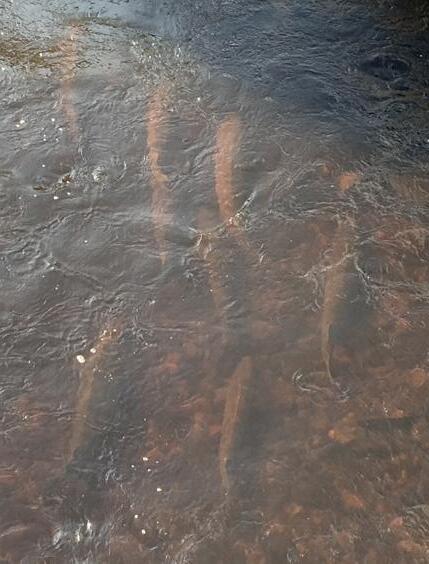
Just downstream of the dam on the Peshtigo River, a newly constructed 160-foot wooden fish viewing platform stretches across the flowing water. Each spring when water temperatures rise, the Peshtigo River becomes host to one of Wisconsin’s largest Lake Sturgeon runs. The sturgeon is a living fossil that has changed little since it first appeared more than 100 million years ago. This giant prehistoric fish is native to Green Bay and its larger tributaries. Adult sturgeon can live more than 150 years and weigh more than 200 pounds.
Learn more about this spring’s unique spawning season from Fox 11 News.
Sauk County maps out master plan
The Sauk County Farm, formerly known as the Sauk County Health Care Center, is a 566-acre property purchased by the county in 1871. It was renamed the Sauk County Healthcare Center in the 1970s and relocated in 2009. Currently overseen by the Sauk County Land Resources and Environment Department, the farm features diverse landscapes, including fields, hills, forest, and a stream. Most of the land is used for agriculture, while the remaining areas preserve historic features and serve as educational spaces. Sauk County LRE Department has developed a property master plan to promote agricultural education and experimentation over the next two decades, focusing on regenerative and conservation-friendly farming practices.
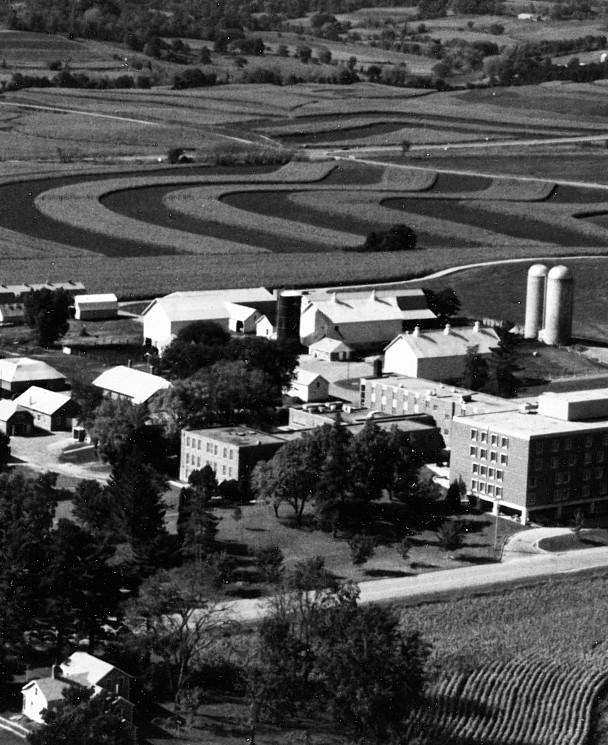
Learn more by viewing the Sauk County Farm StoryMap.
Lights, Camera, Aquatics!
With the warmth of summer, many folks are ready to enjoy our state’s lakes, streams, and rivers. Amanda Schmitz, Aquatic Invasive Species Coordinator for Washington and Waukesha Counties, joined The Morning Blend to educate viewers on how they can help protect our local waterways. Aquatic invasive species threaten the ecology of our waters by pushing out native species and harming aquatic wildlife. These invaders also have negative impacts on our recreation and economy.
Learn more about stopping these aquatic hitchhikers by watching Amanda’s morning show segment .
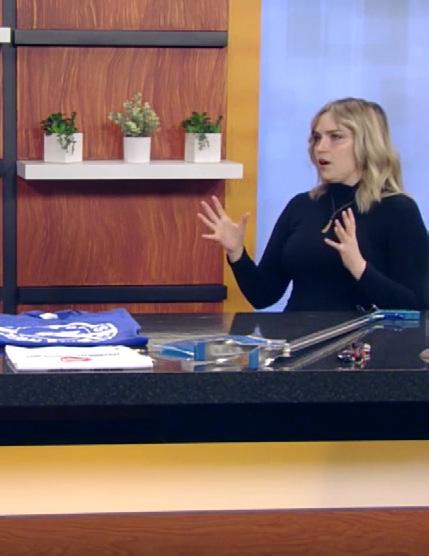
WI Land+Water Apparel for sale!
We are excited to announce that WI Land+Water logo items are now available for purchase! Wildwood Pro has set up a webstore where you can place your orders until 5 p.m. on Sunday, June 18th. You can choose to pick up your order for free at the County Conservation Meeting on July 13th-14th or have it shipped to you for a flat rate. If you won’t be attending the meeting but still want the free pickup option, you can coordinate with someone else who will be attending. This is our only logo item sale in 2023, so don’t miss out!
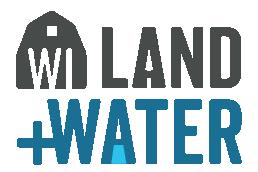
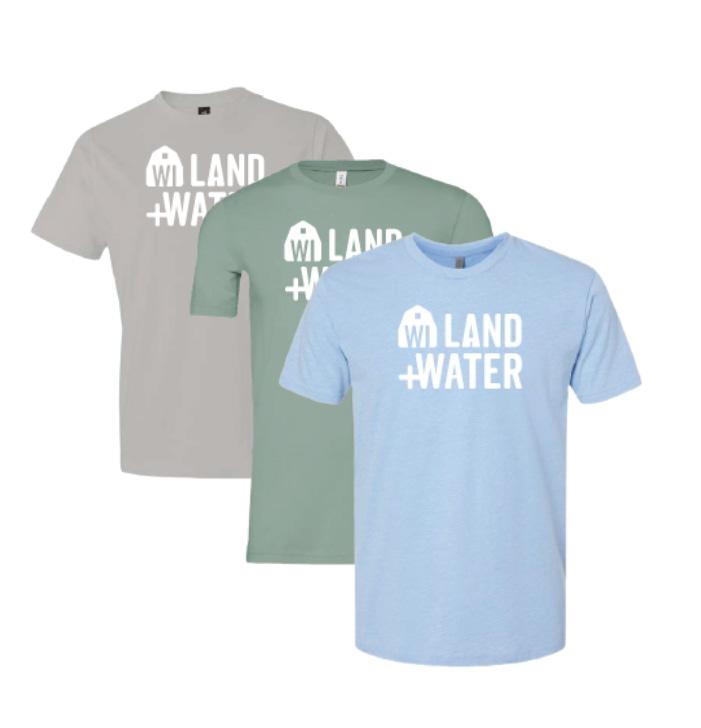
Visit the webstore at https:// www.onlineimprints.com/ wi_land_water/shop/home for a variety of items in different colors.
Please be aware that there are minimum quantity requirements for processing orders, and refunds will be issued if the minimums are not met. All sales are final.
18
wisconsinlandwater.org 121 S. Pinckney St. #420 Madison, WI 53703 (608) 441-2677
NOTE Volume 32 | Issue 1
THE




































































